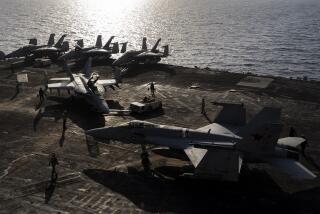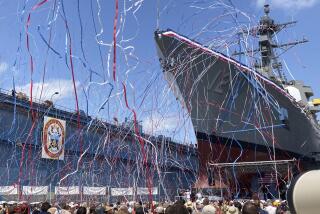Aircraft Carrier George H. W. Bush Christened
- Share via
NEWPORT NEWS, Va. — George H.W. Bush and George W. Bush, the most famous father-son act in American politics since the Adamses, saluted one another at a rain-drenched, shore-side ceremony Saturday, as an aircraft carrier was christened in the name of the father, a naval aviator who survived a direct strike by Japanese antiaircraft fire over the Pacific 62 years ago.
Doro Bush Koch, the former president’s daughter and the current president’s sister, smashed a bottle of sparkling wine against the bow of the vessel, and declared: “I hereby christen thee USS George H.W. Bush. May God bless all who sail her.”
There were Bush family, friends, political supporters, longtime advisors and members of the administration of the first President Bush, some of whom have also served the second Bush presidency.
But against the backdrop of the reunion on a barge tied up at the bow of the vast vessel ran an undercurrent of the troubles facing the present Bush administration.
On the stage just yards from the ship’s bow were two Presidents Bush, the current and former first lady and Defense Secretary Donald H. Rumsfeld, whose direction of the war is drawing increasing criticism. Next to Rumsfeld was Sen. John W. Warner, the Senate Armed Services Committee chairman from Virginia who last week became the most prominent Republican officeholder to publicly question the course of the Iraq war.
In the audience was Colin L. Powell, the retired Army general who served the first President Bush as chairman of the Joint Chiefs of Staff and the second as secretary of State. His disagreements with the current president over the Iraq war are slowly surfacing.
Two other key members of the first Bush foreign policy team -- former national security advisor Brent Scowcroft, and Bush’s secretary of State and White House chief of staff, James A. Baker III -- were seated nearby. Vice President Dick Cheney, who was the first President Bush’s Defense secretary, was not present.
Without mentioning the war but sending an unmistakable signal, the senior Bush declared: “I am very proud of our president. I support him in every single way, with every fiber in my body.”
He did not, however, say he agreed with every decision his son had made.
The ceremony took place amid renewed questions about the complicated relationship of the father and son, famously competitive and proud and yet never shy about demonstrating their love for each other, as they did again Saturday.
The most recent questions were prompted by a report that the elder Bush and his wife, Barbara, felt that their son had taken the wrong approach in dealing with Saddam Hussein and Iraq.
Bob Woodward, the author and Washington Post editor, writes in his new book, “State of Denial,” that Barbara Bush said that her husband was “losing sleep” over Iraq. In addition, Woodward also wrote that Scowcroft, a close friend of the senior Bush, thought that the younger Bush’s presidency was, in some respects, a “disaster.”
White House officials have bristled at the idea that there is any daylight between the father and son on Iraq policy -- or on anything, for that matter, except a competitive round of golf or a chase for the bluefish that run in the Gulf of Maine off the family compound in Kennebunkport.
Without specifying to which statements he was referring, Scowcroft moved earlier in the week to distance himself from the Woodward book. In a declaration eventually distributed by the White House, Scowcroft said that statements attributed to him in Woodward’s book “did not and never could have” come from him.
Notwithstanding any possible differences among those at the gathering, the day belonged to the senior Bush and his wife, Barbara, with plenty of family respect and a dose of teasing. He was choked up as he recalled reading, as an officer and thus censor, the letters crewmen with whom he served sent home during World War II -- and a bit irreverent when a thunderclap interrupted his speech and he said: “I’m finishing, Lord. I am finishing, Lord.”
The younger President Bush said of the new vessel: “She is unrelenting, she is unshakable, she is unyielding, she is unstoppable.” He added, “As a matter of fact, [she] probably should have been named the Barbara Bush.”
For the senior Bush, the moment was especially fitting, given his Navy service. On Sept. 2, 1944, he set off from the deck of the carrier San Jacinto to attack Japanese installations on the Pacific island of Chichi Jima, north of the equator. His Avenger was hit by Japanese fire, and with his engine aflame, he managed to drop his bombs over the target and fly several miles off shore before bailing out. Two others in the plane died.
He spent several hours in an inflated raft in the ocean before he was rescued by the submarine Finback.
“On that day over Chichi Jima, a young American became a war hero and learned an old lesson: With the defense of freedom comes loss and sacrifice,” the younger President Bush said, transferring by implication the World War II experience to the battles the military is fighting today.
The San Jacinto, which was decommissioned in 1947 and turned over for scrap in 1971, was a floating shadow compared with the carrier George H.W. Bush. The new ship’s displacement will be roughly 100,000 tons, approximately 10 times that of the San Jacinto. It is the 10th and, if the Navy’s plan holds, the final carrier in the Nimitz class. The ship is scheduled to be delivered to the Navy in late 2008.
“President Bush,” the younger President Bush said. “Your ship has come in.”
james.gerstenzang@ latimes.com
More to Read
Sign up for Essential California
The most important California stories and recommendations in your inbox every morning.
You may occasionally receive promotional content from the Los Angeles Times.






